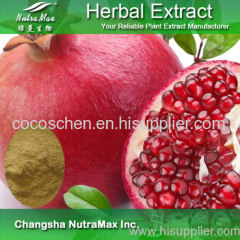
100% Natural Pomegranate Peel Extract 40-90% Ellagic Acid
| Place of Origin: | Hunan |
|---|
Company Profile
| Location: | Changsha, Hunan, China (Mainland) |
|---|---|
| Business Type: | Manufacturer |
| Main Products: | Plant Extract |
Product Description
Botanical Name Pericarpium Granati
Part Used Peel
Specification 40%,60% 90% HPLC
Test method HPLC
CAS No. 476-66-4
Molecular Formula C14H6O8
Molecular Weight 302.20
Appearance Grayish powder
Brand Name Nutra Max
Key Words:
pomegranate
guava
Punica granatum L.
Punica granatum extract
Pomegranate Hull P.E
Pericarpium Granati P.E
Granatum Extract
Pomegranate rind Extract
punica granatum seed
punica granatum fruit extract
pomegranate rind extract
pomegranate flower extract
pomegranates
pomegranate fruit extract
pomegranate skin extract
pomegranate fruit
pomegranate extract skin
pomegranate powder
pomegranate seeds
pomegranate weight loss
What is Pomegranate produced in Changsha NutraMax Inc .?
Native to the area of modern day Iran, the pomegranate has been cultivated in the Caucasus since ancient times. From there it spread to Asian areas such as the Caucasus as well as the Himalayas in Northern India. Today, it is widely cultivated throughout Iran, Syria, Azerbaijan, Armenia, Afghanistan, India, Pakistan, Bangladesh, Iraq, Lebanon, Egypt, China, Burma, Saudi Arabia, Israel, Jordan, the drier parts of southeast Asia, the Mediterranean region of Southern Europe, and tropical Africa. Introduced into Latin America and California by Spanish settlers in 1769, pomegranate is also cultivated in parts of California and Arizona for juice production.
In the Northern Hemisphere, the fruit is typically in season from September to February. In the Southern Hemisphere, the pomegranate is in season from March to May. The pomegranate has been mentioned in many ancient texts, notably the Quran,Homeric Hymns and the Book of Exodus, and is valued by many cultures for its beauty. It has, in recent years, reached mainstream prominence in the commercial markets of North America and the Western Hemisphere.
What is Pomegranate Extract Ellagic acid?
Ellagic acid is a natural phenol antioxidant found in numerous fruits and vegetables including blackberries, raspberries, strawberries, cranberries, walnuts, pecans, pomegranates, wolfberry and other plant foods. The antiproliferative and antioxidant properties of ellagic acid have spurred preliminary research into the potential health benefits of ellagic acid consumption.
Ellagic acid has antiproliferative and antioxidant properties in a number of in vitro and small-animal models. The antiproliferative properties of ellagic acid are due to its ability to directly inhibit the DNA binding of certain carcinogens, including nitrosamines and polycyclic aromatic hydrocarbons. As with other polyphenol antioxidants, ellagic acid has a chemoprotective effect in cellular models by reducing oxidative stress. However, it is antagonistic with catechins, such as those found in tea.

